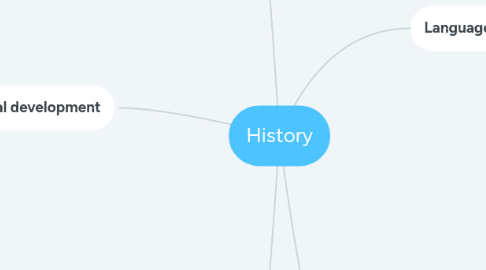
1. Methodology
1.1. use of:
1.1.1. primary sources
1.1.1.1. newspapers
1.1.1.1.1. kk
1.1.1.2. diaries- letters
1.1.1.3. objects from a specific era
1.1.1.4. witnesses
1.1.2. secondary resources
1.1.2.1. sources written by historians
1.1.2.2. sources written after many years
1.1.2.3. sources based on on primary sources
1.2. history changes by:
1.2.1. geographical conditions
1.2.2. individual motives
1.2.3. social and economic conditions
1.2.4. chances occurences
1.3. process
1.3.1. evaluation of resources
1.3.2. interpretation/ critical thinking
1.3.3. synthesis of resources
2. Historical development
2.1. disagreements
2.2. different interpretation/ opinions
2.2.1. e.g Indian independence (imperial historians, nationalist historians)
2.3. new sources based on primary sources
2.4. record of events
2.5. branches of historians/ interpretations
2.5.1. historicism
2.5.1.1. accidentalist
2.5.1.1.1. accidents in history resulted to specific events
2.5.1.2. intentionalist
2.5.1.2.1. intentions and actions of several people defined the history
2.5.1.3. hegelian
2.5.1.3.1. (named after Georg Hegel) intellectual movements cause changes in history
2.5.1.4. marxist
2.5.1.4.1. economy and distribution of wealth lead to many historical events, such as uprisings
2.5.1.5. structuralist
2.5.1.5.1. (known also as functionalist position) military and political structures are the main reasons for change
2.5.1.6. annales
2.5.1.6.1. land and materials- land resources result to disputes and treaties
2.5.1.7. historical sources provide accurate information about the past
2.5.2. postmodernism
2.5.2.1. Historical sources are biased and the language used doesn't have just one single interpretation, therefore we cannot trust them
2.5.3. empiricism
2.5.3.1. nihilism
2.5.3.1.1. history doesn't has a singular path, therefore people can't draw lessons from it
2.5.3.2. teleology
2.5.3.2.1. history has a path and the decision if we will follow it or change it, rests upon us. Therefore, we can learn from history.
2.5.3.3. determinism
2.5.3.3.1. history is predetermined and not subjected to changes, so we cannot obtain knowledge from it
2.5.3.4. information about the past is based on evidence and study of materials
2.5.4. philology
2.5.4.1. study of language used in materials, as language includes ambiguities and an be interpreted in many ways
2.5.5. positivism
2.5.5.1. narrative- chronology
2.5.5.1.1. random events can change the course of history
2.5.5.2. biography- hagiography
2.5.5.2.1. narratives of various people referring/ experiencing historical events and different time periods
2.5.5.3. dialectics- analysis
2.5.5.3.1. clash of old and new knowledge, resulting to formation/ synthesis of new knowledge
2.5.5.4. meta- narrative - total history
2.5.5.4.1. adds to Annales school seeking to integrate long- term, mid- term and short- term factors in order to form a narrative of a 'total history'.
2.5.5.5. emphasises the actions of people in history, sources, sources can provide valid information about them and their actions
2.5.6. negativism
2.5.6.1. all the sources are biased, rejection of human agency
3. Links to personal knowledge
3.1. history as a school subject
3.1.1. analysis- examination of historical resources
3.1.2. cases of disagreements of historians
3.2. political events in my country related to history and identity
3.2.1. study of history and events occured in the past to understand the nowadays situations and relationships among state and non- state actors
3.2.2. Prespa agreement
3.2.2.1. dispute between two countries regarding to the use of name of big historical significance
3.2.3. Grexit
3.3. teachers throughout my school years
3.4. exploration of interesting to me topics
3.5. mission and obligation:
3.5.1. to record what happens objectively
3.5.2. to take into account various perspectives and interpretations, before reaching in conclusions.
3.6. conclusions:
3.6.1. history is not what happened in the past but what historians chose to interpret from the surviving evidence of teh past.
3.6.2. history should be free of political ideologies, biased interpretations
3.6.3. history can't predict the future
4. Language and concepts
4.1. dangers
4.1.1. use of metaphors, cliches
4.1.1.1. wrong interpretations
4.1.1.2. confusions
4.1.2. translation
4.1.2.1. not exact and accurate translation in other languages
4.1.3. vocabulary and tone of the authors/ sources
4.1.3.1. wrong interpretations and conclusions
4.1.3.2. e.g lack of emotions: conclusion that the event and its impacts were not important
4.1.4. use of wrong concepts- ideas
4.1.4.1. e.g genocide/ ethnic cleansing/ crimes against humanity (similar but there are some differences)
4.2. ideal language
4.2.1. well structured
4.2.2. clarity
4.2.3. balance of expressing emotions
4.2.4. free of cliches, metaphors (or if any then explained)
4.2.5. definition of concepts
4.2.6. addressing of ambiguities
4.2.7. use of both original and simplified sources
5. scope and application
5.1. Creation
5.1.1. experts studying this field
5.1.2. other people experiencing situations
5.2. use
5.2.1. protection of identity
5.2.2. prediction for future events
5.2.3. creation of relationships with other people/ nations
5.3. based on evidence and logical thought
5.4. dangers
5.4.1. based on biased sources
5.4.2. different interpretations
5.4.3. lack or resources
5.4.4. affected by political ideologies
